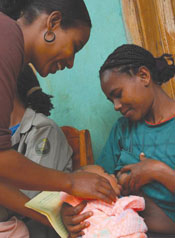Providing a safe, competent and ethical service
As a health professional you should value your ability to provide safe, competent and ethical care that allows you to fulfill your ethical and professional obligations to all the people in your community. You must strive for the highest quality of care you can achieve, at the same time recognising that you have moral choices that you have the right to express and exercise.

Suppose you are planning to provide family planning services to all female clients who are in need of it. However, the amount of contraceptives supplied to you is limited and also you don't have all the different types of contraception that the women might want to use. It doesn't satisfy the needs of all your clients. What is your moral choice as a health professional?
As a health professional your moral obligation will be to provide all your clients with contraceptives of their own preference, but you have resource constraints that influence the standard of your service. You will have to do the best that you can to provide the most effective service that you can for the greatest number of people. At the same time it should be your obligation to inform the managers of your service of your difficulties and press for increased resources for your community.
In order to make moral choices, you should be clear enough about your personal values to be able to recognise potential value conflicts in your work. These value conflicts are issues occurring in everyday working life which will force you think about how they can be resolved. For example, if a pregnant woman in your care insists on giving birth at home even though you counsel her that she and her baby are in possible danger because of complications, there is clearly a conflict of values here. She values the right to give birth in her familiar surroundings, despite the health risks. You value protecting her life and that of the baby more than you value giving in to her opinion.
In the example given above, the woman wants to deliver her baby at home despite the potential risks that you have pointed out. How do you think this value conflict could be resolved?
The woman who is about to give birth clearly has the right to autonomy over her own body. It is her body and she has the right to take decisions about her own health. However in this situation the rights of the unborn baby are also important. This baby also has rights although is unable to express them at this stage. The baby might be protected by law (a legal right), although in practice it is very unlikely that the law could be enforced in this situation.
During your course of study as a health professional, you will acquire sufficient knowledge and skill that will enable you to practice competently; this is your moral right. Your teachers and trainers have a moral obligation to tell you all about the things you will need to know in order to be able to work competently in your community. On the other side of the coin you are expected to work only within the level of competency that you have been trained for, and this is your moral obligation. You should not attempt to perform things that are more difficult than the level of skill that you have been trained to do. For instance, if a labouring mother with a transverse lie comes to give birth in your health facility, you have a moral obligation to refer her to an institution where she can get better care. Your competency as a health professional should include the ability to recognise when a situation is too difficult for you to handle by yourself and when, therefore, you need to make a referral.

Suppose a mother brings her five-year old child to your health facility with the main complaint of cough and fever of three days' duration. When you examine the child, you find that the child has a temperature of 39ºC, flaring nose and shortness of breath. You reach the conclusion that the child's problem is an Acute Respiratory Infection (ARI), possibly pneumonia. What will be the next step that you are expected to do as a health professional?
You should provide the tablets that can control a fever that are available at your health facility and refer the child to the next referral level, where they can get more advanced treatment. In this case your obligation and competence has ensured that you have made a diagnosis and a referral as well as given all appropriate immediate care.